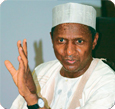The massive manipulation and violence that characterised the last local government elections prompted President Umaru Yar’Adua to call a stakeholders’ meeting to deliberate on the crisis arising therefrom and the problems militating against the conduct of credible elections in Nigeria. The meeting which took place on January 16, 2008 in Abuja had in attendance the leadership of the National Assembly, state governors, leaders of four political parties, ministers, officials of the Independent National Electoral Commission (INEC), top officials of the presidency and the helmsmen of the various security agencies.
In his opening address, the president said that no matter the legislation, no matter the efforts at electoral reforms, no matter the credibility of the electoral umpire, there would continue to be problems unless political leaders changed their attitude. Participants at the meeting were said to have agreed with the president on the need for the political class to show greater commitment to the principles of true democracy through attitudinal changes that will promote and facilitate the conduct of free and fair elections.
That the president has been expressing concern about the perversion of the electoral process is an indication that he has been uncomfortable with a situation that virtually renders democracy meaningless. He has been frank enough to admit that the election which brought him to power was terribly flawed. The unconscionable manner in which his partymen steamrollered the opposition parties to win total victory in the local government elections in a number of states has also been a source of worry to him. The concern of many Nigerians is that the actions of the president have not been in consonance with his expressed feelings and professed intentions. The fact that Professor Maurice Iwu continues to sit pretty and sound majestic in office as INEC chairman provides ample evidence of this.
It is axiomatic that the April 2007 elections made Nigeria a laughing stock in the democratic world. It is also as clear as crystal that Iwu symbolises the electoral charade and the blatantly shameful manner in which it was handled. The International Republican Institute said in its report that the elections did not measure up to those observed in other countries in Africa, Asia, Europe or the western hemisphere. The European Union’s observers recommended that Nigeria should begin the process of establishing an independent and capable electoral administrator and improve on voters registration. The local observers were unanimous in their conclusion that the elections were a complete farce. Even the Peoples Democratic Party (PDP), the major beneficiary from the large scale fraud, has blamed INEC for all the shortcomings that marred the polls. It has accused the electoral body of failing the nation, though it claimed almost all the victories the failure had made possible.
Right from the outset, it was clear that Iwu’s INEC was going to make a hash of the elections. Some of the data capture machines procured for the registration of voters found their way into the houses of some PDP members and the principal characters implicated in the criminal incident were exculpated with laughable arguments. A truckload of election materials disappeared in transit and nothing again was heard about it. It was abundantly clear that Iwu and his INEC operated in cahoots with the ruling party. How rational then is the expectation that a discredited electoral umpire and the politicians that benefited from electoral fraud will fashion out a modality for credible elections in the foreseeable future?
The Nigerian judiciary has never been as busy as it is today. That so many elections have been upturned testifies to the virtual fiasco that the April elections were. This is why there have been strident and persistent calls that Iwu and his discredited electoral commission should be sent packing. The interest of Nigerians can be rekindled in the democratic process if the election reruns are transparently conducted by a reconstituted electoral body made up of men and women of integrity. President Yar’Adua keeps giving the impression that he is preoccupied with efforts to confer credibility on Nigeria’s electoral process. The paradox is that he appears set to entrust the election reruns in the hands of a universally-discredited electoral umpire. The resources that should have gone into the assemblage of people of integrity to constitute a new electoral commission are being expended on frivolous trips by Iwu to the world’s advanced democracies to present a distorted reality as his own election report. For how long will this make-believe continue?
The address of the president that guided deliberations at the stakeholders’ meeting gave the indication that the forum has, from the outset, missed its target. The president downplayed legislation and the credibility of the electoral umpire in ensuring free and fair elections. All his emphasis was on attitudinal change which he hopes to achieve through persuasion. If pleas and homilies were a potent instrument of change in Nigeria, the country will not be where it is today. Unless there are specific laws that prescribe condign punishment for different types of electoral crimes and until men and women of honour are entrusted with the sacred duty of conducting elections, the situation will continue to get worse.
This government already has in place, an electoral reform committee made up of people who are not known to have partisan political affiliations. The delicate assignment of designing a modus operandi for credible elections should be left to the committee. An assembly made up largely of perpetrators and beneficiaries of electoral fraud is unqualified for such a noble task.
Editorials
Nigerian Tribune
Thursday, January 24, 2008



![[PRESS RELEASE] AFFIRMATION OF EMERGENCY RULE IN RIVERS STATE THROUGH “AYES AND NAYS”](https://www.nas-int.org/wp-content/uploads/2025/03/National-Assembly-Ayes-and-Nays-400x250.jpeg)
